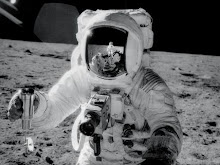There is not much to disagree with this posting and seams fairly accurate.
Max,
The Big Bang theory was totally rejected at first.
But those who supported it had predicted that the ignition
of the Big Bang would have left behind a sort of
'hot flash' of radiation.
If a big black wood stove produces heat that you
can feel, then in a similar manner, the Big Bang should
produce its own kind of heat that would echo throughout
the universe.
In 1965, without looking for it, two physicists at
Bell Labs in New Jersey found it. At first, Arno Penzias
and Robert Wilson were bothered because, while
trying to refine the world's most sensitive radio antenna,
they couldn't eliminate a bothersome source of noise.
They picked up this noise everywhere they pointed the
antenna.
At first they thought it was bird droppings. The
antenna was so sensitive it could pick up the heat
of bird droppings (which certainly are warm when
they're brand new) but even after cleaning it off,
they still picked up this noise.
This noise had actually been predicted in detail
by other astronomers, and after a year of checking
and re-checking the data, they arrived at a conclusion:
This crazy Big Bang theory really was correct.
In an interview, Penzias was asked why there was so much
resistance to the Big Bang theory.
He said, "Most physicists would rather attempt to
describe the universe in ways which require no explanation.
And since science can't *explain* anything - it can only
*describe* things - that's perfectly sensible. If you
have a universe which has always been there, you don't
explain it, right?
"Somebody asks you, 'How come all the secretaries
in your company are women?' You can say, 'Well, it's
always been that way.' That's a way of not having
to explain it. So in the same way, theories which
don't require explanation tend to be the ones
accepted by science, which is perfectly acceptable
and the best way to make science work."
But on the older theory that the universe was eternal,
he explains: "It turned out to be so ugly that people
dismissed it. What we find - the simplest theory - is
a creation out of nothing, the appearance out of nothing
of the universe."
Penzias and his partner, Robert Wilson, won the Nobel
Prize for their discovery of this radiation. The Big
Bang theory is now one of the most thoroughly
validated theories in all of science.
Robert Wilson was asked by journalist Fred Heeren if
the Big Bang indicated a creator.
Wilson said, "Certainly there was something that
set it all off. Certainly, if you are religious, I can't
think of a better theory of the origin of the universe
to match with Genesis.""if you are religious"
Stay tuned for tomorrow's installment: "Why the
Big Bang was the most precisely planned event in
all of history."
Let's see what we get next this should be interesting.


No comments:
Post a Comment